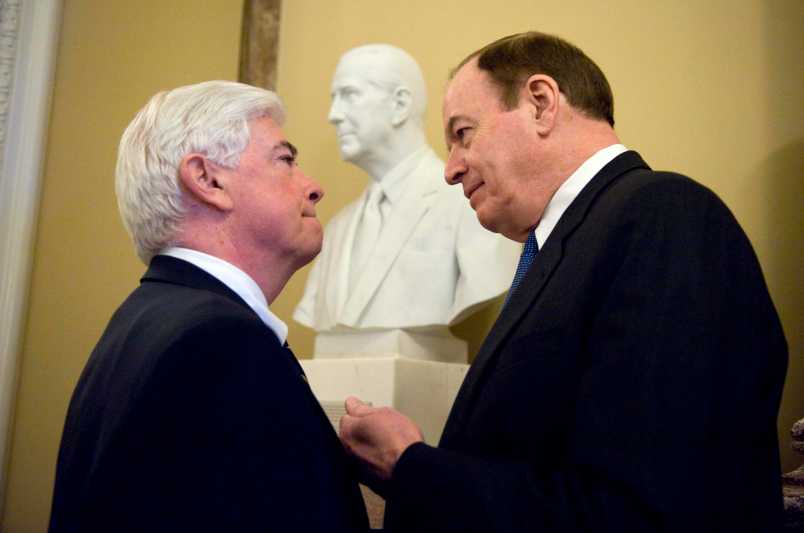It’s been in the works for over a week now, but it’s now official. Senate Banking Committee Chairman Chris Dodd and his Republican counterpart Richard Shelby have agreed to final language on a section of financial reform legislation regarding the unwinding of failed firms. The development could speed up progress on financial reform legislation, which had slowed to a crawl as Republicans awaited a final announcement.
The deal does away with a proposed $50 billion fund, raised by assessing a fee on big financial institutions, which would have been used to help liquidate systemically significant, insolvent firms.
That fund, as Dodd said on the floor this afternoon, “was opposed by the Obama Administration.”
He went on:
Other Republicans have now expressed concerns about that pre-paid fund. So, because whether they pay in advance or after the fact, these costs will be paid by Wall Street and not taxpayers, I have no objection to dropping that provision.
Creditors will be required to pay back the government any amounts they received above what they would have gotten in liquidation. Those who directly benefited from the orderly liquidation will be the first to pay back the government at a premium rate.
The change is, substantively, not very significant. But Republicans have been halting progress on the overall bill as they awaited this agreement. So it may serve to break (yet another) financial reform logjam. We shall see.
You can read Dodd’s prepared remarks below:
“For over a year, Senator Shelby and I have been working on ways to end bailouts. And while we have had our differences in other areas, we have always shared a commitment to ensuring that taxpayers will never again be forced to bail out giant Wall Street firms that fail.”
“Last November, I tasked Senator Mark Warner of Virginia and Senator Bob Corker of Tennessee with producing an agreement on how to resolve failed companies.”
“They did a tremendous job. I want to commend both of our colleagues, they worked very hard to draft language that is part of the underlying bill. The package they produced would create effective oversight for large firms and make these firms pay for the risks they pose to our country and to the economy. Their agreement put a mechanism in place to guarantee that when large firms fail, they fail. The management is fired, creditors and share holders take losses, the company is liquidated, and taxpayers aren’t on the hook.”
“This is a complicated area, and a number of my colleagues on the other side of the aisle had reservations. And so I spent the last few months working with Senator Shelby to clear up any misconceptions people may have had, and otherwise address their concerns.”
“After weeks of negotiations, months really if you consider all of the work that has gone on on this piece of legislation over the last year, I am proud to say that the two of us have an agreement in this area and we intend to offer it as an amendment to the bill early this afternoon.”
“Let me go over the amendment.”
· “First, let me say that most of the provisions stay intact, because we agree on the fundamentals of this bill.
o “There will still be an orderly liquidation mechanism for FDIC to unwind failing systemically significant financial companies.”
o Secondly, shareholders and unsecured creditors will still bear losses and management will be removed.”
o “Third, regulators will still have the authority to break up a company if it poses a grave threat to the financial stability of the United States. A very important point.”
o “Large bank holding companies that have received TARP funds will still not be able to avoid Federal Reserve supervision by simply dropping their banks.”
o “Most large financial companies are still expected to be resolved through the bankruptcy process.”
o “And the bill will continue to eliminate the ability of the Federal Reserve to prop up failed institutions like AIG was.”
“These measures represent a fundamental change in our country’s ability to protect taxpayers from the economic fallout of having a large, interconnected firm collapse.”
“These measures will end the idea that any one company is ‘too big to fail.'”
“These measures will prevent large failing firms from holding our country hostage, extorting giant taxpayer funded bailouts under the threat of economic disaster.”
“And so today, we announce a few changes to the larger package.”
· “First – as I’ve said, one of the ideas proposed by some of our colleagues, including our friends from the other side of the aisle, was to create a fund, paid for in advance by the largest financial firms, to cover the cost of liquidating failed companies. This was not in my initial draft in November, and was opposed by the Obama Administration. Other Republicans have now expressed concerns about that pre-paid fund. So, because whether they pay in advance or after the fact, these costs will be paid by Wall Street and not taxpayers, I have no objection to dropping that provision.”
· “Creditors will be required to pay back the government any amounts they received above what they would have gotten in liquidation. Those who directly benefited from the orderly liquidation will be the first to pay back the government at a premium rate.”
· “Congress must approve the use of debt guarantees.”
· “The Federal Reserve can only use its 13(3) emergency lending authority to help solvent companies, and”
· “Regulators can ban culpable management and directors of failed firms from working in the financial sector.”
“With this agreement there can be no doubt that this Senate is unified in its commitment to end taxpayer funded bailouts.”










